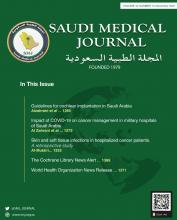Original Articles
Guidelines for cochlear implantation in Saudi Arabia
Alzahrani et al establish a unified clinical practice guidelines for adults and pediatric cochlear implantation (CI) for the Ministry of Health specialist hospitals in the Kingdom of Saudi Arabia. It is based on evidence-based medicine including institutions and individuals’ experiences. This study provides a safe framework for the multidisciplinary team to select appropriate CI candidates. Bilateral CI is recommended for adults and pediatrics with bilateral severe/profound hearing loss. Atraumatic approach is advised in order to spare the residual cochlear and vestibular function.
see page 1265
Original Articles
Impact of COVID-19 on cancer management in military hospitals of Saudi Arabia
Al Zahrani et al evaluate a multi-centric, record based, retrospective, comparative study of 2 groups of adult cancer patients treated in military hospitals in Saudi Arabia. A total of 1574 cancer patients were collected. The total number of patients in 2019 was 856 and 718 in 2020, of which females were in majority with 55.6% in 2019 and 55.2% in 2020. The mean age of the sample of 2020 was reported slighter higher than 2019. The number of new cancer patients decreased in 2020 but increased in peripheral hospitals. It decreased in Riyadh and Jeddah hospitals. No significant changes observed in time duration for acceptance of new patients and oncology treatment initiation from 2019-2020. COVID-19 did not affect oncology service in Saudi Arabia’s military hospitals. New cancer cases reduced during the pandemic. Although, cancer patients are at increased risk for COVID-19 complications, including death.
see page 1272
Number of antibiotics prescribed for the treatment of skin and soft-tissue infections.
Skin and soft tissue infections in hospitalized cancer patients. A retrospective study
Al-Mutairi et al assess the clinical and epidemiological characteristics of 204 hospitalized cancer patients with skin and soft-tissue infections (SSTIs). Patients with complicated and uncomplicated SSTIs were included. Breast cancer was the most common solid tumor in all patients with SSTIs. Exit site infection was the most common SSTI in cancer patients, followed by wound infection, and cellulitis. Exit site infection was prevalent, with Staphylococcus aureus being the most common pathogen. Appropriate antibiotics were prescribed in many cancer patients with SSTIs.
see page 1333
Case Series
Metastatic 4S neuroblastoma with excellent outcome in Saudi cancer center
ALZhrani et al review a small series of infant neuroblastoma (NBL) in a single Saudi medical institution over 10 years. Six infants had stage 4S characteristics. Biopsies confirmed that the adrenal gland was the primary tumor site for 3 patients, while the other 2 had retroperitoneal sites. Four patients had favorable histology, and one had unfavorable histology. All patients had liver metastasis, and no bone marrow or skin metastasis was recorded. All patients received chemotherapy except one, and all survived with no disease progression at a median follow up to 5 years. This study confirm that NBL-4S is a curable cancer, especially with early recognition and intervention. Chemotherapy is the first-line treatment for symptomatic patients.
see page 1353
- Copyright: © Saudi Medical Journal
This is an Open Access journal and articles published are distributed under the terms of the Creative Commons Attribution-NonCommercial License (CC BY-NC). Readers may copy, distribute, and display the work for non-commercial purposes with the proper citation of the original work.







